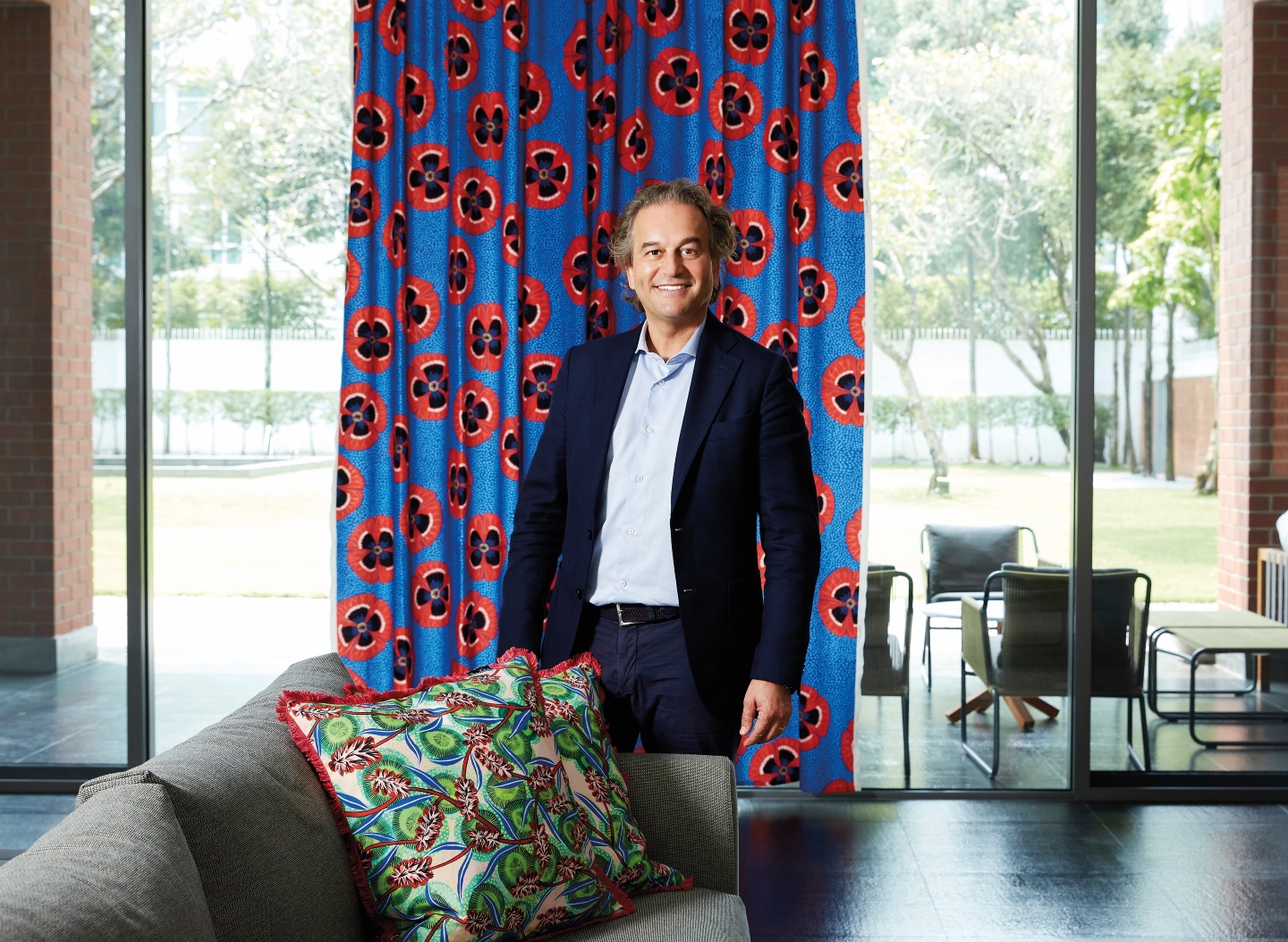
Looking ahead, Christian Fischbacher aims to expand its sustainable fabric line, Benu, and make it a bigger part of the brand (Photo: SooPhye)
As CEO of a Swiss luxury textiles business that has been in the hands of his family since 1819, Michael Fischbacher is often asked, “How did you do it?” More specifically, how did he, the youngest of three siblings and from the sixth generation, come to be in charge of the St Gallen-based Christian Fischbacher, a global luxury fabrics company that is over two centuries old? The interesting thing, he has found, is the size of a company does not really matter. When there is family involved or there are multiple members, the same issues inevitably crop up: Who joins the company and as what? More importantly, who becomes the next CEO? Should it be someone from within the fold or do they bring in an outsider? Succession is a big and difficult topic and “many consultants consult on nothing else”, says Fischbacher, or Micki to most.
Happily for him, there was no discord when he took over the running of the brand in 2008, a year after his brother, Christian Fischbacher VI, was made sales director for Eastern Europe. The company famously designs and produces fine interior fabrics, rugs, wallpaper, bed linen and accessories.
“A lot of it has to do with luck, and part of it has to do with being a small family,” says Micki. “My wife [Camilla, who is creative director], has something like 25 cousins in the world and I have two. My brother is not so interested in management, so he was okay with me managing. My sister Susan does social work; she has always done that and is not involved in the company.”
Micki and Camilla were in Kuala Lumpur last year to celebrate Christian Fischbacher’s collaboration with Rebecca Duckett, 100 Patterns in 100 Days, a capsule collection of fabrics and carpets inspired by her designs. The pair are personal friends of the Malaysian artist and her husband, David Wilkinson, whom they met and got to know during their year-long stay in KL in 1994.
“We knew them from Owen Rebecca Designs, at Lot 10 then, and found her works charming and lovely. In turn, Rebecca thought it was interesting that I came from a textile family, which I didn’t think was so.”
An exhibition of the same name and displaying the collection was held last year at Pentago House, KL, at which Duckett showed the paintings she did in 2020 during lockdown in her country house in Piedmont, Italy. Subsequently, Micki and Camilla, en route to Genoa from Switzerland, dropped by for an overnighter, saw her creations and suggested working together on the capsule collection.
Launched at the Paris Déco Off last January, the capsule features three patterns — Poppy, Blossom and Pink Weed — picked from her pandemic output; fabric based on an earlier work called Ikan;
a carpet inspired by an original piece titled Harimau; and two Tigers taken from two separate paintings for a textile design.
christian_fischbacher1.jpg
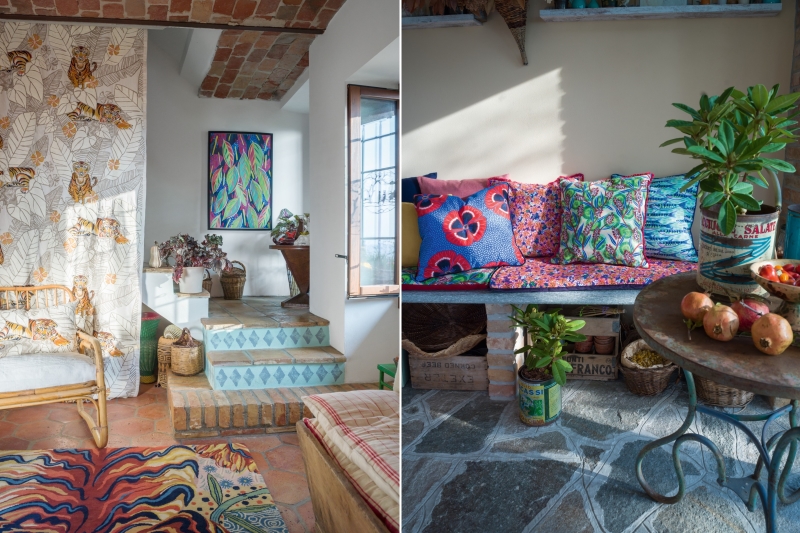
Micki, who had a hand in the design selection, was taken by Ikan, which aligns with Fischbacher, a not uncommon name from a particular region of Switzerland and which means “the guy from the fish creek”. He says there were paintings that did not work for textiles, such as birds — considered bad luck in Italy, a big market — and cute frogs, but might as wallpaper, an idea they could go back to.
When the Fischbachers met the Wilkinsons in KL, Micki was employed by an agency that sold huge Mitsubishi Electric screens used in stadiums. Things did not work out, and he and Camilla moved to Hong Kong, to look for a job. “It wasn’t so easy to find one in Malaysia because I studied Chinese and all I could do was speak it. But seven million Malaysians could speak Chinese, too,” says the sinology graduate from Oxford University, where he met Camilla, who studied Middle Eastern culture and art.
Micki “fell in love” with Chinese culture when he was about 14, thanks to his father, who travelled to Asia every year and came home with fascinating stories and photographs. He took up kung fu, but only for a while because the teacher did not stay long in St Gallen, tucked in the heart of the Swiss Alps. So, he read whatever he could find on China in his school library and bought books such as Dream of the Red Chamber and tapes to learn Mandarin. “I was a very strange child,” he admits, laughing.
When it came time to choose what course to pursue, he had no interest in business. Then he decided, why not Chinese? Micki thought his parents would put up a fight when he told them. Instead, dad just said okay, and asked if he wished to study abroad. He chose the UK, in order to focus on Chinese studies instead of taking it as just one paper, if he had gone to the US.
Dad’s influence aside, joining the family business was far from his mind nor was it expected of him. But just as his grandfather had offered his father the opportunity to be part of the company, Micki’s parents visited him in Hong Kong, where he was a consultant for direct investment in China, with a proposition that was hard to resist: work with architects to develop a new way of distribution for the company, starting in Switzerland.
“I was excited because it was a bit entrepreneurial and a new market, really. In hindsight, I probably should have stayed in Hong Kong. I moved away in 1996, then the boom came up, the really big China boom. It’s a pity I missed that.
“On the other hand, it was an exciting opportunity to build. Maybe 30% of our business is now done with architects in contract, which means selling to hotels and larger public buildings, rather than only residential clients.”
michael_fischbacher_and_wife_camilla.jpg
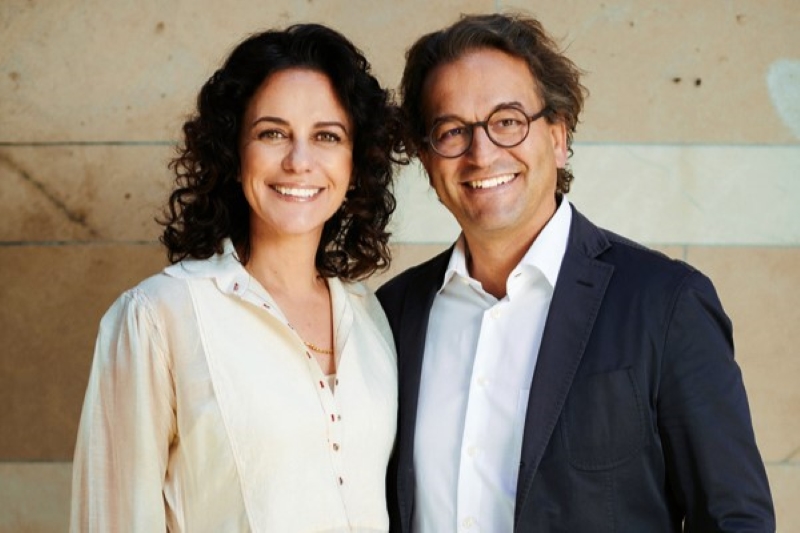
Architects usually start thinking about fabrics when they are done with designing a building, Micki explains. He leaps one step ahead by talking to them about functional fabrics and what Christian Fischbacher can do during the design stage itself. “Then we develop things together. That’s the direction our company has been taking since I took over in 2008, because it was my father’s vision that we should [focus on] this area.”
Finding fresh ways of doing things with an existing team can be tough because people are generally reluctant to change. “This is partly, I think, why my father offered the job to me. ‘You’re new. You’re strong in the sense that you’re from the family. You can do new things and people won’t stop you.’ I got lucky and found good people to help me. We are in a good way.
“We are a small business, but as soon as you have more than three or four employees, it’s not realistic to think it’s just the family deciding everything, because you do it together with people who will bring their own ideas and initiatives. If they’re strong, you have to let them develop things, otherwise they’re going to leave. I now work with great people who help me yet come up with their own ideas. It changes every time there’s a new manager and things become a little bit different.”
What does he bring to the company, or hope to do?
“I hope to basically expand our work with architects, both in Europe and elsewhere. I’d say being here now makes me realise there are great opportunities also in Southeast Asia. We’re in the high end of the industry for interior fabrics. It used to be not such a big market in East Asia, except for Japan. But it’s grown dramatically in recent years and we really want to do more, in Singapore, Malaysia, and Thailand, where we’ve been doing hand-tufted carpets for 15 years. India, which has a huge furnishing fabrics industry, has become more interested in European fabrics.”
But China is first and foremost, so being fluent in Mandarin, one of seven languages Micki speaks, helps. If you use it in China, the Chinese, being very practical and pragmatic people, like it and you become friends more easily, he observes. In Japan, however, being able to speak their language makes a much bigger difference because the Japanese are afraid to converse in English.
“When you speak Japanese to them, it becomes a completely different conversation,” says Micki, who spent five years in Japan with Camilla and their three children. The brand set up its subsidiary, Nihon Fisba (for fish) Co Ltd, in Tokyo in 1971, besides expanding to France, Germany, Italy and England in the 1970s.
Looking ahead, Christian Fischbacher aims to expand its sustainable fabric line, Benu, and make it a bigger part of the brand. “Geographically, we want to expand in Asia, the fastest-growing area in the world, and America.”
Sustainability has been a brand focus since 2009, when it became the first company in the interior fabrics industry to take recycling seriously. Camilla met a professor in New York who showed her a fabric sample made from plastic bottles. She did not think it looked very nice but liked the idea of how it was made. Her team then spent 1½ years developing the Benu Recycled collection, which comprises fabrics created using recycled PET bottles and waste textiles.
benu_talent_recycled_fr_chair.jpg
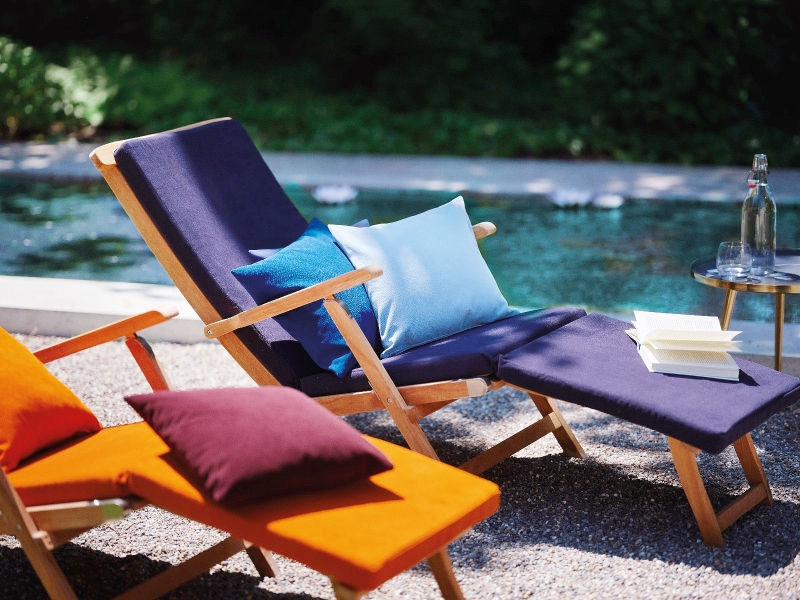
Micki thought Phoenix would be a good name for the collection because “it’s sort of about from ashes back to the soaring sky. But it sounds a bit strange. So, my wife came up with Benu, which is the ancient Egyptian phoenix. It’s the same idea — the bird that burns and comes back. It’s nicer to pronounce and also a play on the words ‘be new’.”
Then, they rolled out Benu yarn, made using clothing or discarded materials from the fashion industry. The company works with a producer that collects the scraps, sorts them by colour and then mashes them up to produce a new yarn, without using additional water and chemicals, and much less energy. It is an efficient way of recycling resources that would otherwise end up in the landfill, he adds.
How do clients take to a luxury label using so-called ‘discards’? “It’s an interesting generational question,” Micki replies. A case in point was when the brand celebrated its 200th anniversary in 2019 with a big exhibition in Milan, Italy, where it put up a big curtain made from Benu fabric. A video showed how the plastic bottles are cleaned and shredded, then moltened and turned into little balls that are pressed through something like a showerhead to produce short, soft yarn.
Young students watching exclaimed, “Wow, this is so great!” They touched the material and loved it. Likewise, those in their 30s, Micki recalls.
“Then people my age — I’m 53 — looked at it said, ‘It is very interesting. This is the way forward; we should do it’. But it was in their head, not their hearts. An older lady friend of my mother’s put her arm around me, took me aside and whispered, ‘Micki, you can’t do this. A brand like yours, you can’t put garbage’.
“You could literally see how the different generations reacted differently. The older people didn’t really understand the point. My generation, probably mostly in power in the economy, knows we should do something for sustainability.
“I remember as a child, when we used to go south of the Alps to Italy, they had these amazing rainfalls with water coming down like crazy, very heavy rain that we never had up north. Now we have that all the time. Our climate now is like what it was in the south, 40 years later. Things are changing within our lifetime and people are aware that we need to do something.”
He believes using existing resources to make new yarn is an effective move towards the company’s goal of becoming circular. “Everybody talks about it but nobody’s at the stage where you can take it [home] and then bring it back. Our goal is to be able to do that in 2024: Spin new yarn, take it back and recycle it.
“When we came out with our recycled fabrics, the market wasn’t ready. To be honest, only journalists understood because it’s a beautiful story. But about three, four years ago, the market changed. We now get people who call us, saying, ‘We hear you do recycled fabrics. We want to work with you’. This is something we had always hoped for but it didn’t happen until after about 10 years.”
Asked what he likes most about his job, Micki says, “Almost everything. I like the products and fabrics a lot. I love the design aspect of it. I’m not an artistic person myself, but I like artists and art and working with them on the production side.”
fischbacher_benu_check_14678_benu_remix_14454_benu_raw_2858_benu_structure_14677_l_web.jpg
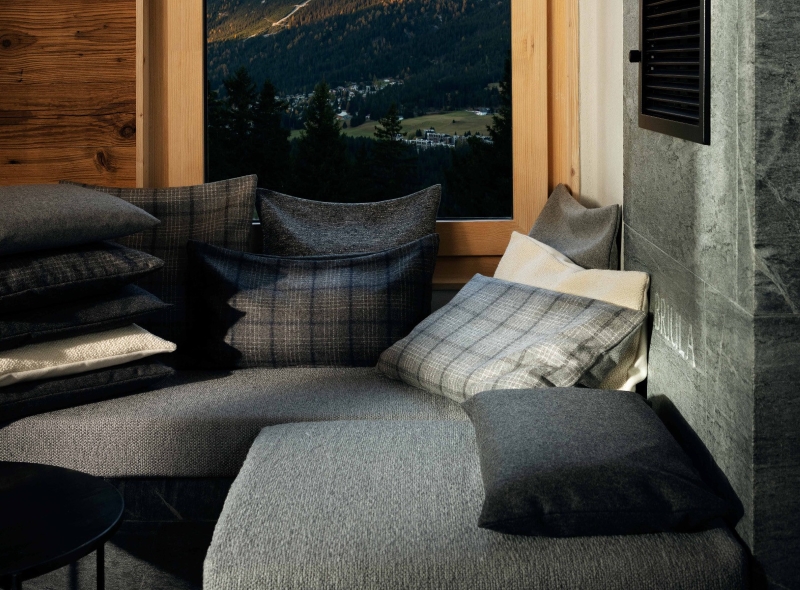
The abundance of ideas in the fabrics industry hooks him, compared to, say, trading or working in a company that manufactures screws. “They make so much money, but I’d probably not like it so much. I like being where I can work with artists and architects who, in their own way, are artists too, and creative professionals.”
Does he have a succession plan in place? “We have three children and they’re welcome to join the company. Sirus, 23, actually has, in marketing. But whether he wants to stay is really up to him. We need more young people in marketing because things are changing very fast and they’re just better at it. That generation, their thumbs work faster than our brains.”
His eldest, Darius, is in Los Angeles, the US, working in a French fashion frames company. And Roxana is studying history of art and music at Edinburgh University, Scotland.
“There really is no pressure. It’s our family philosophy that this is an old company which has lasted for many generations. There will be a last generation, but it doesn’t really matter. I would definitely not want any of my children to work with the brandthat and not be happy. They should do what fulfils them rather than some idea of continuing a legacy.”
And what should a home have to be complete? “Curtains, of course. They give softness to a place. I do like that, not just because we make them. We have travelled a little all over the place but we don’t buy a lot of new things. I don’t really believe in consumerism. But we have items we like and cherish, things we have a personal relationship with. A lot of the art we collect, we know the artists personally.
“Our kitchen table was bought in Malaysia in 1995 and we’ve taken it around the world with us. I have a little bench that I picked up from a beach in Hong Kong. I don’t think a home has to [particularly] have anything. It should be a place where somebody feels happy, where it’s her place. I think a home should be done up for yourself, not others.”
Personally, Micki finds “so much joy in the job, the colours. Camilla is important in creative development and also more talented. I’m from the market side, but I bring input. Product photography has a lot of stuff; I get to schlep it for my wife. The studio is next to my office. When I’m bored, I just have to look at the new fabrics they make and I’m motivated again to do more.”
Fabrics were what drew Christian Fischbacher I to pick the best hand-woven and embroidered items he could gather to sell in St Gallen, the birthplace of European textiles. The 16-year-old eventually founded his namesake brand to bring out his own products. Two centuries on, the company remains synonymous with luxury, quality materials and detailed prints. Not bad for a guy from the fish creek, eh?
This article first appeared on Jan 15, 2023 in The Edge Malaysia.


